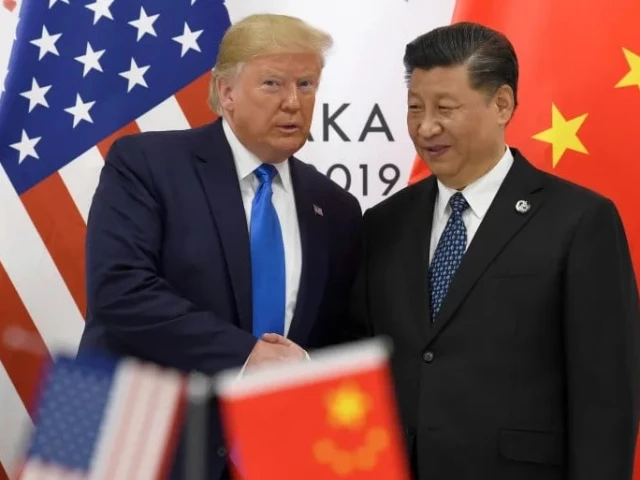Trump’s China tariff talk clouds IMF, World Bank meetings
Former IMF official warns Fund risks being pushed to enforce Trump’s geopolitical goals, pressure China

Finance chiefs gathering in Washington this week were ready to discuss the global economy’s surprising resilience in the face of Donald Trump’s tariff assaults – until US-China trade war rhetoric reignited with the US president threatening 100% duties on Chinese imports and whipsawing financial markets, Reuters reported.
The annual meetings of the International Monetary Fund (IMF) and World Bank are now certain to be dominated by questions over whether Trump's vow to retaliate against China’s dramatically expanded export controls on rare earths will plunge the world’s two largest economies back into a full-blown trade war.
Trump’s said his new tariffs and export curbs would take effect on November 1 and threatened to cancel a meeting with Chinese President Xi Jinping later this month in South Korea. The duties would shatter a delicate truce crafted by Washington and Beijing over five months that brought tariffs down from triple-digit levels and prompted improved IMF global growth forecasts.
US Treasury Secretary Scott Bessent on Monday sought to walk back the threat, telling Fox Business Network that he believed the Trump-Xi meeting would proceed and that there would be US-China staff-level meetings this week on the sidelines of the IMF and World Bank gathering.
“The 100% tariff does not have to happen,” Bessent said. “The relationship, despite this announcement last week, is good. Lines of communication have reopened, so we’ll see where it goes.”
Bessent added that the US would “stand firm” against the new global Chinese rare earths export controls, while Trump said on the Truth Social media site on Sunday: “Don’t worry about China, it will all be fine!”
The softer tone sparked a strong rebound in US stocks at the start of trading in New York on Monday, with the tech-heavy Nasdaq Composite index up more than 2% and other major indexes up more than 1%.
Martin Muehleisen, a former IMF strategy chief who is now with the Atlantic Council, said Trump’s threats may be posturing for negotiating leverage, but said they will inject volatility into the week’s proceedings.
While China has some leverage over Trump due to its global dominance in rare earths, which are essential for tech manufacturing, Muehleisen said it is not in Beijing’s interest to plunge back into an environment of triple-digit tariffs.
Prior to the escalation on Friday, IMF Managing Director Kristalina Georgieva had touted the global economy’s ability to withstand multiple shocks, from tariff costs and uncertainty to a slowing US job market, rising debt levels and rapid shifts brought on by AI’s rapid adoption.
In a preview of the IMF’s World Economic Outlook forecasts due on Tuesday, Georgieva said last week that the global GDP growth rate for 2025 would be only slightly less than the 3.3% for 2024. Based on tariff rates that were lower than initially feared – including the US-China duties – the IMF in July raised its 2025 GDP growth forecast by two-tenths of a percentage point to 3.0%.
Finance ministers from the Group of Seven industrial democracies are expected to meet on Wednesday to discuss efforts to step up sanctions pressure on Russia that is aimed at ending Moscow’s war against Ukraine.
A British government source said that finance minister Rachel Reeves wanted to ensure joint action with G7 and European Union countries to cut Russia’s energy revenues and access to overseas assets that comply with international law.
Among these options that G7 ministers will discuss is a European Union plan to use Russian frozen sovereign assets to back a loan of 140 billion euros ($162 billion) to Ukraine.
The US footprint at the meetings will be large, extending from tariff discussions to Bessent’s calls for the IMF and World Bank to pull back from climate and gender issues to focus on their core missions of financial stability and development.
Muehleisen, the former IMF official, said the Fund risks being pushed by its largest shareholder to enforce Trump’s geopolitical goals – ratcheting up pressure on China and potentially extending more aid to US allies like Argentina without adequate reforms.
“Is it really still a global, multilateral organisation, or is it becoming a bit more of an appendage of the US Treasury?” he said




















COMMENTS
Comments are moderated and generally will be posted if they are on-topic and not abusive.
For more information, please see our Comments FAQ